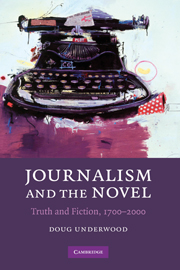Book contents
- Frontmatter
- Contents
- Acknowledgements
- Introduction
- Chapter 1 Journalism and the rise of the novel, 1700–1875: Daniel Defoe to George Eliot
- Chapter 2 Literary realism and the fictions of the industrialized press, 1850–1915: Mark Twain to Theodore Dreiser
- Chapter 3 Reporters as novelists and the making of contemporary journalistic fiction, 1890–today: Rudyard Kipling to Joan Didion
- Chapter 4 The taint of journalistic literature and the stigma of the ink-stained wretch: Joel Chandler Harris to Dorothy Parker and beyond
- Epilogue: The future of journalistic fiction and the legacy of the journalist-literary figures: Henry James to Tom Wolfe
- Appendix: The major journalist-literary figures: their writings and positions in journalism
- Notes
- Index
Chapter 1 - Journalism and the rise of the novel, 1700–1875: Daniel Defoe to George Eliot
Published online by Cambridge University Press: 09 July 2009
- Frontmatter
- Contents
- Acknowledgements
- Introduction
- Chapter 1 Journalism and the rise of the novel, 1700–1875: Daniel Defoe to George Eliot
- Chapter 2 Literary realism and the fictions of the industrialized press, 1850–1915: Mark Twain to Theodore Dreiser
- Chapter 3 Reporters as novelists and the making of contemporary journalistic fiction, 1890–today: Rudyard Kipling to Joan Didion
- Chapter 4 The taint of journalistic literature and the stigma of the ink-stained wretch: Joel Chandler Harris to Dorothy Parker and beyond
- Epilogue: The future of journalistic fiction and the legacy of the journalist-literary figures: Henry James to Tom Wolfe
- Appendix: The major journalist-literary figures: their writings and positions in journalism
- Notes
- Index
Summary
I declare upon my honour, that I have neither added nor diminished; nay so scrupulous have I been, that I would not make the smallest variation even when my friends thought it would be an improvement. I know with how much pleasure we read what is perfectly authentick.
– James Boswell on his biographical methods.I am … joined with eleven others in reporting the debates in Parliament for a Morning Newspaper. Night after night, I record predictions that never come to pass, professions that are never fulfilled, explanations that are only meant to mystify. I wallow in words.
– Charles Dickens from David CopperfieldOh, for shorthand, to take this down.
– Another comment by Boswell on his biographical methods.All poets are humbugs, all literary men are humbugs; directly a man begins to sell his feelings for money he's a humbug.
– William ThackerayOne night, when James Boswell was socializing with Samuel Johnson, the eighteenth-century Englishman of letters and the subject of Boswell's biography that turned both men into literary legends, Johnson rose up in annoyance at the barrage of questions Boswell was aiming at him. Boswell and Johnson had a warm friendship, and, even though Johnson was flattered, knowing Boswell's intention of memorializing him for the ages, he couldn't contain his irritation.
- Type
- Chapter
- Information
- Journalism and the NovelTruth and Fiction, 1700–2000, pp. 32 - 83Publisher: Cambridge University PressPrint publication year: 2008



